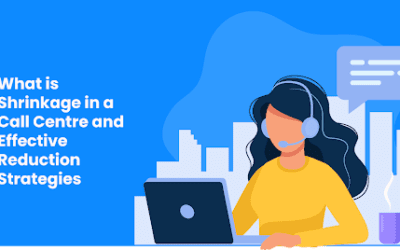A contact centre plays a significant role in effective customer service. It goes beyond just making and receiving calls.
What exactly goes on in a contact centre? What goes on inside a contact centre beyond making and receiving calls?
This article contains everything you need to know about contact centres. You’ll discover the benefits and essential tips for running a contact centre.
In the end, we’ll show you what your business stands to gain from employing the best practices mentioned in this article.
That said, let’s dive in.
Check out:
What is a contact centre?
A contact centre is an office, team, department, or system (whatever suits your fancy) that attends to customers across different communication channels.
Contact centres achieve this through:
- Inbound and outbound calls
- Voice
- Text messaging
- Live chat screen sharing
- Video conferencing.
What does a contact centre do? And why do you need one?
Let’s find out.
What are the benefits of a contact centre?
There’s so much to gain from contact centres.
For starters, a contact centre:
- Improves customer experience: Your customers will receive prompt, efficient, and personalised assistance.
- Increases efficiency: Contact centres can reduce response times.
- Gives you 24/7 coverage: Contact centres are available any day, anytime.
- Reduces cost: Hiring, training, and maintaining large customer service teams is unnecessary.
- Improves data collection: Contact centres use valuable customer data to enhance customer satisfaction.
Do you see? There are many benefits to having a contact centre.
Contact centres help you keep your customers.
Now you know what a contact centre is.
Moving on.
Who is a contact centre agent?

A contact centre agent is a customer service representative.
And their primary responsibilities? Responding to customers’ questions and complaints.
The duty of a contact centre agent is demanding.
What exactly qualifies a contact centre agent?
What qualities should you consider when hiring for a contact centre?
Contact centre agents are the face of your business. They could either make or break your reputation. So, when hiring, consider:
- Strong communication skills: Contact centre agents must have clear, conversational skills.
- Empathy: They must be compassionate.
- Problem-solving skills: They must be creative.
- Adaptability: They must always be professional.
- Positive attitude: They must be patient during challenging interactions.
Those are qualities of professional contact centre agents.
However, it’s not just about hiring. You must keep your staff. You should reduce employee turnover in your contact centre.
How?
We’ll show you.
How do you reduce employee turnover in a contact centre?

Frequent employee turnover destroys productivity. You need to do all you can to keep your employees from resigning or getting fired.
How?
- Provide competitive salaries.
- Create a supportive and inclusive work environment.
- Offer flexible scheduling options and paid time off.
- Encourage clear communication.
- Recognise excellence through rewards and incentives.
- Address burnout, and
- Provide coaching and development opportunities.
Talking about coaching, How do you coach your contact centre agents?
Essential tips for coaching contact centre agents

To coach like a pro, follow these five tips:
- Set clear expectations: Be clear about your goals.
- Provide regular feedback: Ensure constructive feedback. It motivates agents to improve.
- Encourage open communication: Encourage thought-sharing. It’s key to successful working relationships.
- Offer training and development opportunities: It keeps agents up-to-date on industry best practices. Help your contact centre agents grow in their careers.
- Lead by example: Be a role model for your agents. Practise effective communication and problem-solving.
We shared more powerful coaching tips in this guide.
Are there right tools and techniques for excellent results? Yes, of course. Let’s find out.
Practical training resources for coaching contact centre agents

Practical coaching resources produce outstanding results.
Ensure you have them.
To coach your contact centre agents, use the following:
- Scripts and templates: Helps them better handle customer interactions.
- Role-playing exercises: Helps agents practise handling real-life situations.
- Online training courses: Do this for your online and on-premises contact agents.
- Customer feedback: This shows you what’s working and what’s not.
- One-on-one coaching sessions: Provides personalised feedback and guidance.
What are the different types of contact centres, and what are they used for? And how do they work?
Read on to find out.
What are the types of contact centres?
There are many types of contact centres. Each differs based on your business needs.
So, we grouped these contact centres into 4 main categories:
- Inbound contact centres: Inbound contact centres attend to customers across different communication channels. They don’t initiate contact. Instead, they receive incoming calls, emails, and chats.
- Outbound contact centres: Outbound contact centres initiate contact. They send calls, emails and chats to customers and prospects.
- Multichannel contact centres: Multichannel and omnichannel contact centres are similar. How? They both handle communication across different channels. This means customers can reach them on any platform. But here’s a difference. Communication channels in multichannel contact centres aren’t connected. They’re each independent of the others.
- Omnichannel contact centres: Omnichannel support is unique. It’s the ultimate goal of any contact centre. Omnichannel contact centres contain all interactions into one single customer profile. Agents have a complete history of the customer’s interactions. Customers do not need to repeat information or queries whenever they switch channels. That’s the difference. Again, omnichannel contact centres can automate routine tasks.
Now, you know the four types of contact centres. Let’s decide if you need one.
What is the difference between call centre vs contact centre?
The terms “call centre” and “contact centre” aren’t the same.
They’re different.
Take a look at these five differences between call and contact centres:
- Communication channels: This is the main difference. Contact centres are reachable on all communication channels.
- Skill set: Call centre agents must have strong telephone communication skills. Meanwhile, contact centre agents need a broader range of technical and communication skills.
- Technology: Contact centre solutions use more advanced technologies.
- Service level agreements (SLAs): Contact centres often have more comprehensive SLAs.
- Complexity: Call centres handle high volumes of telephone calls. Meanwhile, contact centres can incorporate a wide range of technologies and processes.
Not yet sure if you need a contact centre?
Let’s go deeper.
Which industries benefit from contact centres?
Here are industries where contact centres are helpful:
- Telecommunication companies: Managing connectivity and network issues.
- Retail companies: Handling complaints and inquiries and tracking orders.
- Healthcare organisations: Scheduling appointments, handling prescription refill requests and insurance queries.
- Financial services: For loan applications, credit card disputes, and managing investments.
- E-commerce companies: Handling orders, product queries, and customer complaints.
- Technology companies: For technical support, software installation and troubleshooting.
- Government: For immigration, social welfare, and tax issues.
These are a few industries that need contact centres.
Are you one of them? It depends on your needs and goals.
Contact centre technology can help you scale faster.
How? Through contact centre automation.
What is contact centre automation?
Contact centre automation is the technology that handles routine contact centre tasks. An example of contact centre automation is IVR. It’s short for Interactive Voice Response. It provides self-help options for customers. No need for customers to wait in long queues.
Other examples? Speech recognition and AI-powered chatbots.
These 6 contact centre automation systems are so unique you won’t need a sidekick anymore.
- Automated interaction
- Scheduling automation
- Forecasting automation
- Automated agent guidance
- Workflow automation
- Sales automation
Talking about technology, contact centres aren’t free from cyber attacks. So, be alert. You must protect your business data AT ALL COSTS.
What are some data security best practices in a contact centre?
Here are eight tips to help you secure your contact centre:
- Encrypt your data: This protects your data from cybercriminals.
- Use secure networks: Only access contact centre systems and data from secure networks.
- Train your employees: Train your employees to recognise phishing scams.
- Update your software: This will fix security vulnerabilities and prevent potential data breaches.
- Use secure passwords: Strong passwords make it difficult for scammers to guess.
- Update security measures: This reduces the risk of cyberattacks and data breaches.
- Link your device to a virtual private network (VPN): It encrypts the data you transmit and receive.
- Use remote wiping capabilities: This helps with stolen devices. You can wipe the device from afar once you smell a rat.
Follow these data security best practices, especially with your work-from-home staff. Do these things, and you’ll be safe from cyber threats.
And, the sweetest part? The right contact centre boosts your chances of achieving cyber safety.
This leads us to the next part of this guide – choosing a contact centre.
How do you choose contact centre software?
Have you picked the right contact centre software yet?
No? Don’t worry, we’ll help you decide.
Consider these fundamental factors when choosing contact centre software:
- Scalability: Ensure it can adapt as your business grows or changes.
- Call routing and management: Flexible routing tools help manage calls, queues, and agents.
- Third-party integration: Ensure it integrates with other systems you use.
- Reporting and analytics: To provide valuable performance insights.
- Automation: Ensure that it automates repetitive tasks. This frees up agents’ time for more critical tasks.
- Customisation: Ensure the contact centre software is flexible.
- Ease of use: It must be easy to use and navigate.
- Security: Consider the software’s security measures.
- Customer support: The vendor should offer robust customer support. This includes help with setup, training, and ongoing maintenance.
- Price: Ensure it has a flexible pricing model to suit your needs.
Is there a contact centre that ticks all these boxes?
Of course, there is.
Best contact centre solutions for the best customer experience
There are many contact centre solutions for your business.
It all depends on your needs. To help you, we’ve narrowed down the list.
Here are the top contact centre solutions to consider:
- TelebuHub: Also known as the Hub. This omnichannel contact centre software is scalable and flexible. Its flexible pricing model suits your business, no matter the size. TelebuHub boasts robust reporting and analytics capabilities. Its customisable interface makes it easy to use, even if you aren’t tech-savvy. TelebuHub has advanced call routing and queue management options. It is by far the best for your business.
- Cisco: Cisco’s WebEx contact centre solution helps businesses handle customer relations. It can integrate with other Cisco technologies for an all-in-one solution.
- Avaya: Avaya is contact centre software for small businesses. Avaya helps businesses manage customer interactions. It provides businesses with the tools they need to handle large call volumes.
- Exotel: Exotel is cloud-based contact centre software. It offers a low-cost solution.
- Vonage: Vonage helps businesses manage customer interactions. It integrates with other Vonage technologies for a seamless customer experience.
- RingCentral: This contact centre software helps businesses manage customer interactions. And its unique feature? Helping you handle high call volumes and enhance customer satisfaction.
- Hubspot: Hubspot helps businesses improve their customer experience. It integrates with other Hubspot technologies for a better customer experience.
- Zendesk Talk: Built into Zendesk Support, It provides a simple solution for managing customer interactions. Zendesk Talk supports customers over the phone and keeps track of customer communication.
- LiveAgent: This contact centre helps manage customer interactions and improve customer experience. It helps businesses with real-time monitoring and reporting capabilities.
We wrote a more detailed article on these top contact centre solutions. Discover what they are, how they work, and their key features.
Check out:
Want to measure your contact centre software’s productivity?
Track your KPIs. We’ll talk about it in the next section.
Contact centre KPIs and metrics you should track

Contact centre metrics and KPIs help you measure performance.
They show you what you’re doing right. They’ll also highlight areas that need improvement.
So, for best results, track these 7 contact centre KPIs:
- Average Handling Time (AHT): The average time a customer spends on the phone with an agent.
- First Call Resolution (FCR): Percentage of issues resolved during the first call.
- Abandoned Calls: Instances where a customer hangs up before speaking to an agent.
- Average Speed of Answer (ASA): The average time it takes for a contact agent to answer a call.
- Customer Satisfaction (CSAT): Customer satisfaction with their interaction with your contact centre. A survey will do.
- Agent utilisation: The time agents spend handling customer interactions versus other activities.
- Occupancy rate: Percentage of time an agent uses to handle customer interactions.
For a more in-depth guide on KPIs and metrics, read this article.
What is the future of contact centre operations?
Here are trends for contact centres to expect in the near future:
- AI and automation are on the rise. They’ll enhance productivity.
- Remote work is here to stay, So stay ahead of the curve.
- Omnichannel experiences are the norm. They’ll help you deliver amazing customer experiences.
- Data-driven decision-making will help you get valuable insights into your performance and make informed decisions.
- Customer experience is king. Use KPIs to improve the customer experience.
These changes will affect the way you do things.
Find out more about what’s in store for contact centres in 2023 and beyond.
Grow with the times.
Use the right software and strategy.
That’s how you’ll succeed.
Use TelebuHub to drive sales and boost your revenue
Finding the best software is key to your success.
You need simple and flexible contact centre software like TelebuHub.
What do you stand to gain? Amazing customer experiences.
So, use TelebuHub’s omnichannel support to meet your customers wherever they are.
And the coolest part?
So, why wait? Request a demo and enjoy exceptional customer satisfaction.
Or sign up for free. Start delivering unique experiences your customers will love.






0 Comments